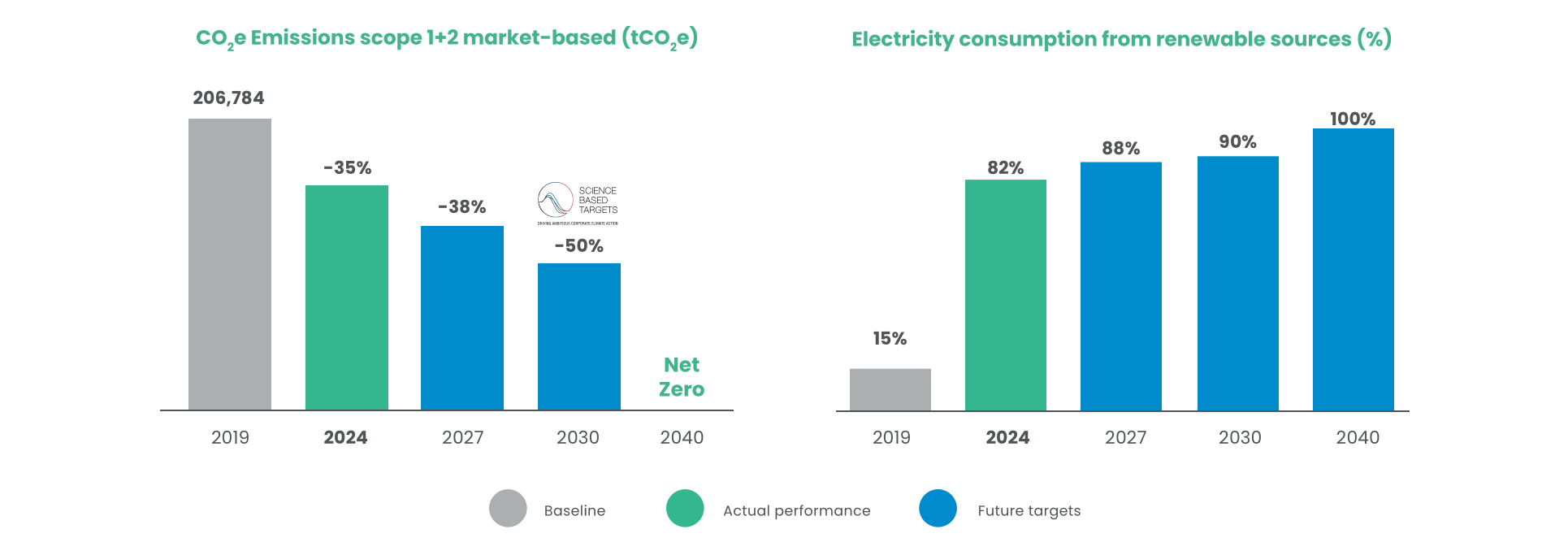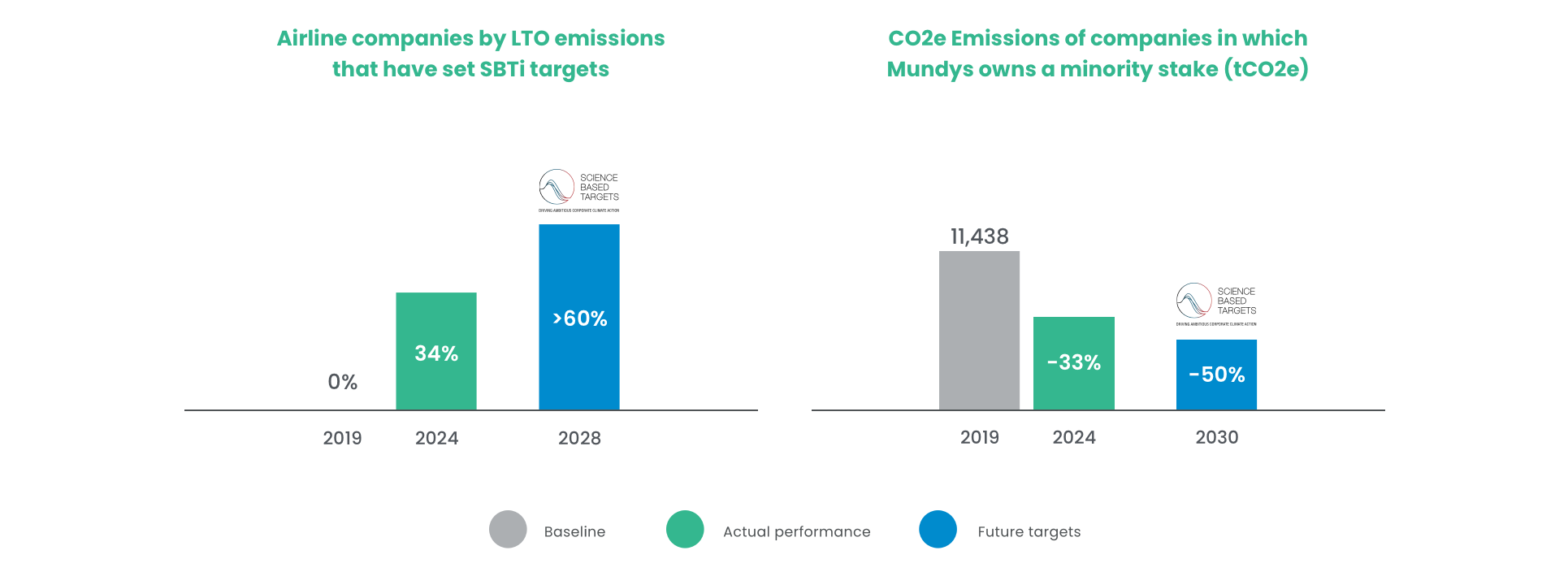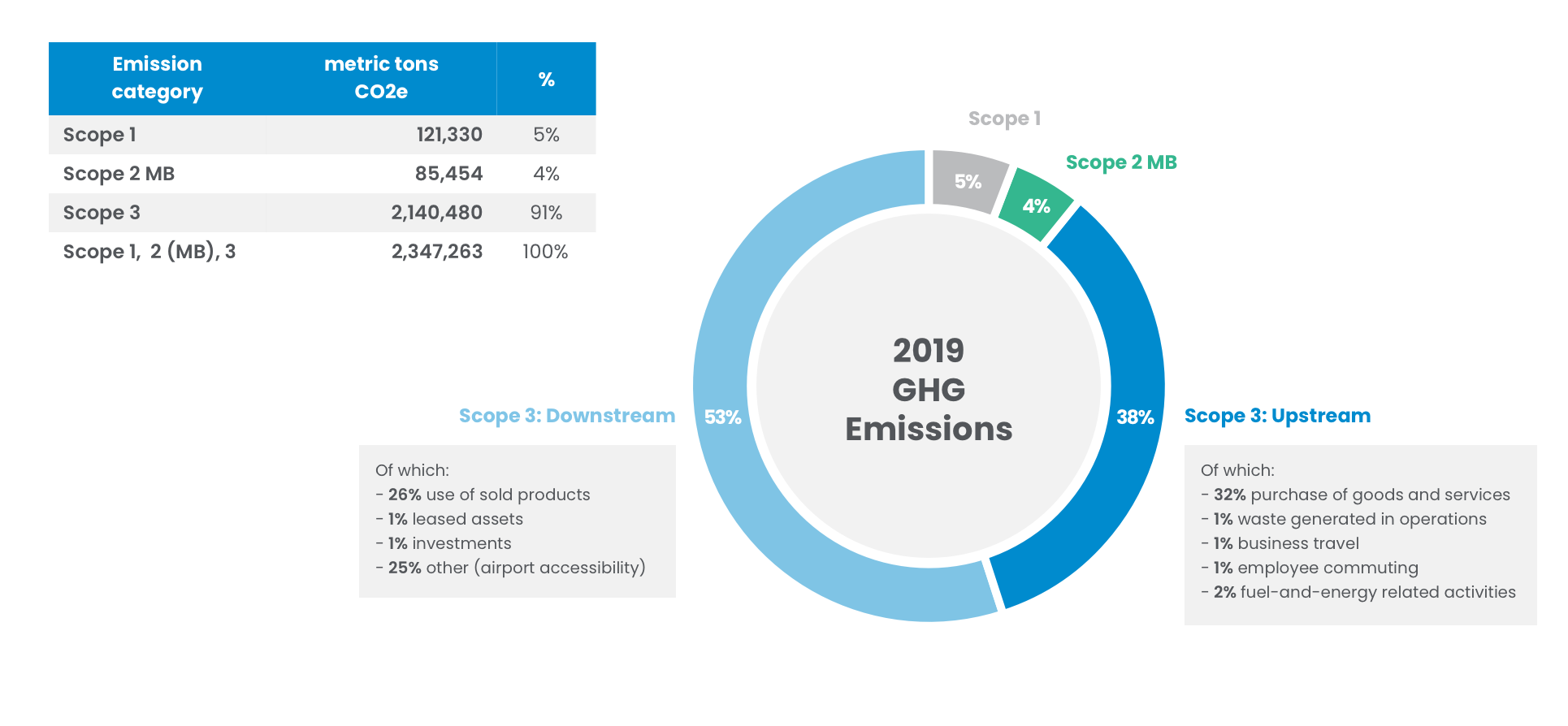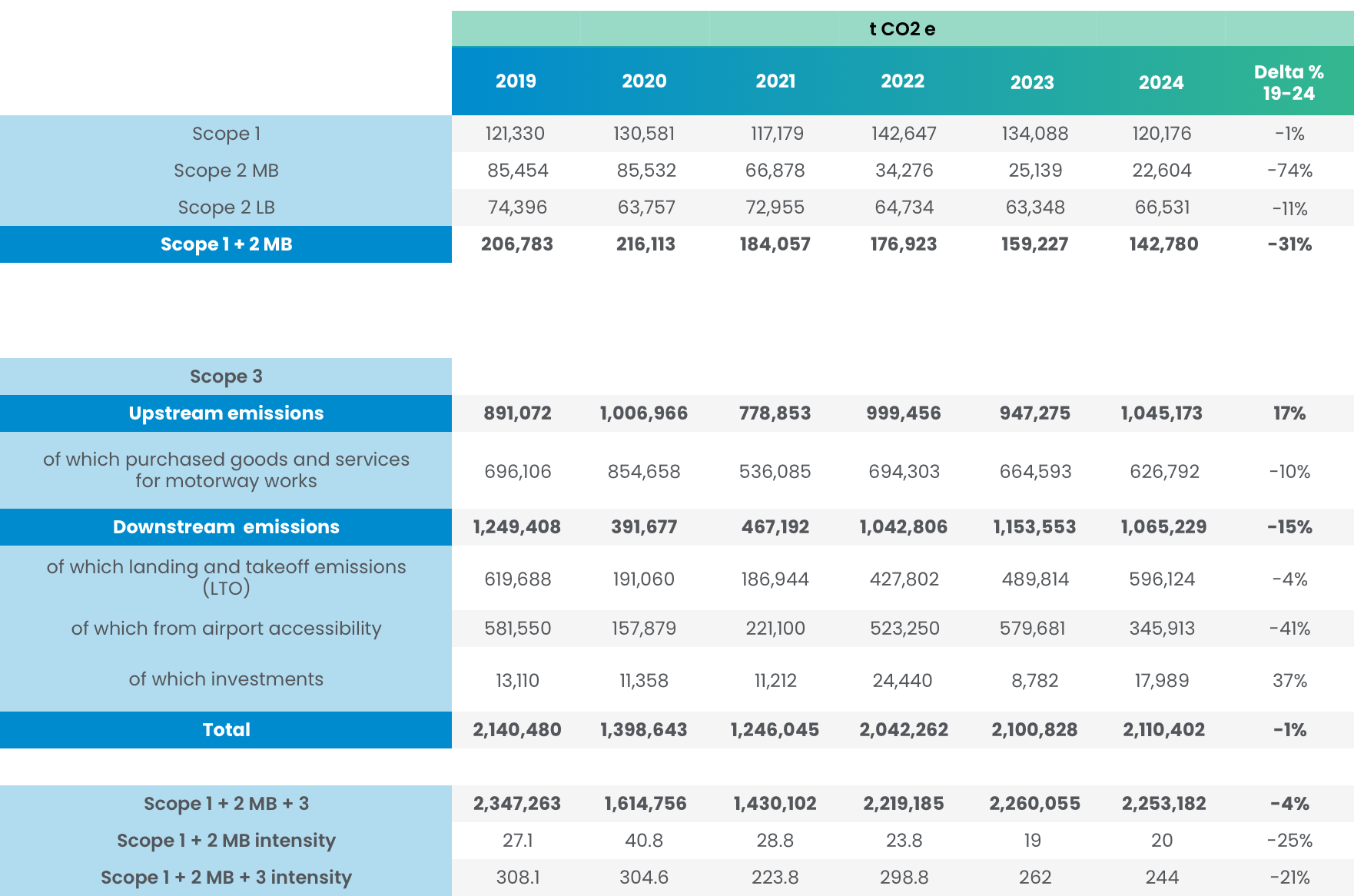At Mundys we are committed to actively support the energy transition of the transport industry. To do so, we set for ourselves ambitious targets aligned with scientific trajectories and specific actions to Implement.
Since 2023, Mundys has been included in the “A-list” of CDP: the assessment is available online – CDP 2024 assessment
The transport of people and goods is one of the activities having the greatest impact on the social and economic development of territories and communities. However, the transport sector is also one of the largest sources of greenhouse gas (GHG) emissions, due to fossil fuels that remain the dominant source of energy consumption in transport.
For our direct emissions, we are committed in achieving net-zero by 2040, 10 years earlier than the objectives of the Paris Agreement.
To reduce our scope 1 & 2, we focus on key emission targets, in line with the recommendations of SBTi (Science Based Target initiative) under the 1.5°C scenario. In particular:
- -50% by 2030 absolute reduction of direct emissions vs 2019 baseline (tCO2e) - target SBTi validated
- 77% by 2030 electricity consumption from renewable sources, reaching 100% by 2040 at the latest

Off-setting activities were not considered in the definition of the target, and the associated decarbonization action plan.
CO2 e Emissions scope 1+2 market-based (tCO2e) | Electricity consumption from renewable sources (%) |
2019 - 206.784 2023 - -23% 2027 - -38% 2030 - -50% 2040 – Net Zero | 2019 – 15% 2023 – 75% 2027 – 61% 2030 – 77% 2040 – 100% target SBTi |
Legenda: Baseline, Actual performance, Future targets
We are also committed to reduce indirect emissions along the value chain with the long-term ambition of achieving net-zero by 2050. We are eager to play an active role in teaming up with our stakeholders to engage in joint efforts to decarbonize the transport industry.
To reduce our scope 3, we focus on key emission targets (covering >67% of indirect GHG emissions), in line with the recommendations of SBTi under the well-below 2°C scenario. In particular:
Upstream emissions:
- -22% by 2030 intensity reduction of emissions related to purchased materials associated with road infrastructure development, maintenance and operation vs 2019 baseline (tCO2e/mln km travelled) - target SBTi validated

Downstream emissions:
- >60% by 2028 engagement of airline companies by emissions of aircrafts during lending and take-off phases (LTO) to support them in setting emission reduction plans – target SBTi validated
- -50% by 2030 absolute reduction of emissions of companies in which Mundys holds a minority stake vs 2019 baseline (tCO2e) – target SBTi validated

Other emissions:
- -30% by 2030 intensity reduction of indirect emissions (scope 3) of Fiumicino airport vs 2019 baseline (KgCO2e/passenger)

CO2e Emissions intensity from motorways’ purchased goods and services (TCO2e/mln km travelled)
- 2019 - 9.8
- 2023 - -15%
- 2030 - -22%
Airline companies by LTO emissions that have set SBTI targets
- 2019 – 0%
- 2023 – 20%
- 2028 - >60% target SBTi
CO2e Emissions of companies in which Mundys owns a minority stake (tCO2e)
- 2019 - 11.483
- 2023 - -29%
- 2030 - -50% target SBTi
Scope 3 emissions of Fiumicino airport (excluding aircraft sources) (KgCO2e/passenger)
- 2019 – 14.3
- 2023 - -6%
- 2030 - -30%
The year chosen for baseline emissions is 2019, which represents a pre-pandemic scenario.

Transcript GHG Emissions Baseline
| Emission category | Metric tons CO2e | % |
| Scope 1 | 121,330 | 5% |
| Scope 2 MB | 85,454 | 4% |
| Scope 3 | 2,140,480 | 91% |
| Scope 1, 2(MB), 3 | 2,347,263 | 100% |
2019 GHG Emissions
| Scope1 – 5% | Scope 2: MB – 4% |
Scope 3: Downstream – 53%
| Scope 3: Upstream – 38%
|
Effective governance is key to making concrete progress towards implementing the climate change strategy and thus fulfilling our responsibilities to all the stakeholders. Mundys’ Board of Directors is the decision-making body that leads and oversees implementation of the climate strategy, with support also provided by Board committees, periodically informed by the Company’s management tasked with carrying out the action plan.
The oversight of ESG issues by the Board of Directors is a good governance practice that Mundys also encourages its asset companies to adopt, requesting approval of ESG plans and targets by the respective boards at main subsidiaries. Board and executive committees that oversee ESG issues, including those regarding climate change, have already been set up within all the main subsidiaries and this approach is progressively being extended throughout the Group.
FOR MORE INFORMATION ON THE GOVERNANCE, REFERENCE SHOULD BE MADE TO THE INTEGRATED ANNUAL REPORT AND TO THE FOLLOWING LINK
In order to foster management accountability on sustainability performance across the portfolio, Mundys promotes the adoption of significant portion of incentive remuneration (15%-20% oof the annual incentive) linked to the achievement of emission reduction target and other sustainability objectives, alongside financial and operational metrics.
Mundys cooperates with public decision-makers and partners to contribute via our industry knowledge, assets, experience and innovation capabilities to accelerate decarbonization of the transport industry, thereby contrasting climate change in line with the Paris Agreement.
MORE ON RESPONSIBLE LOBBYING HERE
MORE ON PARTNERSHIP HERE
In line with the TCFD recommendations, Mundys performs a Climate Change Risk Assessment (CCRA) to identify, analyze and evaluate major climate-related risks and opportunities, accounting for different time horizons (short-, medium- and long-term) and considering different climate change scenarios.
The actions aimed at cutting emissions may be summarised as follows:
Direct emissions
- Production and consumption of electricity from renewable sources: the installation of photovoltaic plants and electricity storage systems, the purchase of certified, high-quality green electricity
- Sustainable mobility: migration of the fleet to electric vehicles, with the installation of charging infrastructure to service the new fleet, and the consumption of sustainable, low-emission fuels (e.g. HVO) where electric vehicles do not offer a technologically and/or economically viable solution
- Use of low-emission energy: geothermal projects and the use of biofuels (e.g., biomethane, HVO) in energy plants (e.g., boilers, eating systems, emergency systems)
- Energy efficiency: energy efficiency projects for buildings, involving the replacement of heating, ventilation and air conditioning systems (HVAC), heating systems and high-efficiency heat pumps, the installation of LED lighting and the use of intelligent monitoring and optimization systems to manage energy performance
Indirect emissions
- Intermodality and improved accessibility: projects to improve the accessibility of airport terminals, with increased connections using urban public transport and better connectivity via integrated rail-air solutions, projects promoting urban mobility services and micro-mobility, the construction of motorway parking areas providing intermodal exchange points and access to sharing services
- Enabling sustainable mobility: the installation of EV charging infrastructure, investment in enabling the large-scale supply of sustainable aviation fuel or SAF, technology services and systems enabling improvements in urban and extra urban traffic flow, resulting in shorter journey times, lower fuel consumption and reduced air emissions
- Promotion of the circular economy: practices involving the recovery and reuse of materials in infrastructure construction and maintenance (e.g., road pavement), the purchase of goods and services with lower life-cycle emissions
- Sustainable value chain: the involvement of suppliers and customers (e.g., airlines, cement producers) in driving the transition to low carbon operations, in participation in technology partnerships and in energy transition initiatives (e.g., the Pact for the Decarbonisation of Air Transport)
The following table presents the progress vs 2019 with respect to the targeted emission:

Transcript GHG Emissions Metrics
TCO2e
| 2019 | 2020 | 2021 | 2022 | 2023 | Delta % 23 – 19 | |
| Scope 1 | 121.330 | 130.581 | 117.179 | 142.647 | 134.088 | 11% |
Scope 2 MB | 85.454 | 85.532 | 66.878 | 34.276 | 25.139 | -71% |
| Scope 2 LB | 74.396 | 63.757 | 72.955 | 64.734 | 63.348 | -15% |
| Scope 1 + 2 MB | 206.783 | 216.113 | 184.057 | 176.923 | 159.227 | -23% |
Scope 3
| Upstream emissions | 891.072 | 1.006.966 | 778.853 | 999.456 | 947.275 | 6% |
| Of which purchased goods and services for motorway works | 696.106 | 854.658 | 536.085 | 694.593 | 664.593 | -5% |
| Downstream emissions | 1.249.408 | 391.667 | 467.192 | 1.042.806 | 1.129.075 | -10% |
| Of which landing and takeoff emissions (LTO) | 619.688 | 191.060 | 186.944 | 427.802 | 489.814 | -21% |
| Of which investments | 13.110 | 11.358 | 11.212 | 24.440 | 8.782 | -33% |
| Of which Other (Airport accessibility) | 581.550 | 157.879 | 221.100 | 523.250 | 549.681 | -5% |
| Total | 2.140.480 | 1.398.643 | 1.246.045 | 2.042.262 | 2.076.350 | -3% |
| Scope 1 + 2MB + 3 | 2.347.263 | 1.614.756 | 1.430.102 | 2.219.185 | 2.235.557 | -5% |
| Scope 1+ 2MB intensity | 27,1 | 40,8 | 28,8 | 23,8 | 18,5 | -32% |
| Scope 1+ 2MB + 3 intensity | 308,1 | 304,6 | 223,8 | 298,8 | 259,2 | -16% |
Mundys' climate strategy and performance are each year covered by an external certification (ISO 14064) and publicly disclosed in external documents and international recognized frameworks.
More on our annual Carbon Disclosure Project (CDP) disclosure here
More on Our Integrated Annual Report(Pg. 29-32 & 101-197)
FOR MORE INFORMATION ON THE SUSTAINABLE FINANCE FRAMEWORK, CLICK HERE